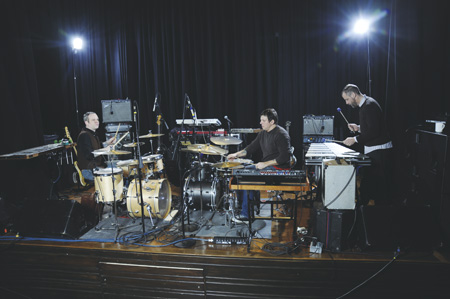The Drummers of Tortoise: John McEntire, John Herndon, Dan Bitney
From the July 2010 Issue of Modern Drummer magazine, available in print here.
After nearly twenty years on the scene it helped create, Tortoise—and the group’s three drummers—continues to push sonic boundaries and rhythmic inventiveness. Here John McEntire, John Herndon, and Dan Bitney talk about their musical inspirations, comment on the band’s place in the current music environment, and wonder about the drinking habits of the original space-age-bachelor-pad musician.
 MD: Not that it would be in keeping with your sound, but when you’re not playing to a receptive audience, is there ever a tendency to do drummer-y things?
MD: Not that it would be in keeping with your sound, but when you’re not playing to a receptive audience, is there ever a tendency to do drummer-y things?
Herndon: I try not to. Sometimes, if the mood hits, I’ll try to bring it up—but more for myself. Sometimes we can get into a little dialogue and crack each other up.
Bitney: Sometimes you react, but it can hurt the music. In Tortoise we’re lucky enough to have great audiences. But in pickup gigs around town I can close my eyes and concentrate. Sometimes you have great improv gigs when no one is there and you can do tongue-in-cheek things like play the intro fill to “Rock With You.” [laughs]
MD: Why don’t American audiences have the same attention span for instrumental music or jazz that other audiences seem to have?
Herndon: Obviously you don’t live in Chicago, because we have it here. [laughs] But if there was a more adventurous booking agent, we could have more creative music sitting alongside more conventional rock or pop. In the ’60s, Sun Ra would be playing with the MC5 and Miles would play rock festivals. If people were exposed to it, they would realize there’s a lot to be had from creative instrumental music. Jazz was put into this intellectual music ghetto somehow. Somebody’s going to have to step up and be adventurous with their booking. Advertisement
McEntire: A lot of it has to do with the underlying elements of the economy. There’s always been good state sponsorship of art in Europe—there’s funding for festivals, artists and musicians can get grants…. That doesn’t exist here.
Bitney: What’s weird is that there seems to be a rule against instrumental bands on late-night talk shows. We’ve never done it. I wonder if there’s some story of Martin Denny coming on drunk or something. [laughs]
MD: How does an instrumental group survive today, when the industry is in such flux?
McEntire: In our case we were just so lucky we got started when we did and had the fortune of people paying attention to us in the ’90s. The “marketplace” for music is so crowded now. The signal-to-noise ratio is so bad—so many things coming out all the time, you can’t even keep up with all of it. We happened to find a few people that were interested in what we were doing, and that’s been able to keep the name alive. I really don’t know what the future holds…it seems to be more precarious all the time. In the late ’90s we thought, Hey, we can make a living at this. Now it’s a little more, I’m not so sure. Advertisement
MD: But talent will always shine through, no?
McEntire: We’re in the era when everyone is an author, and I have mixed feelings about that. It’s good that the whole process has been democratized, but in the past there was a machinery involved that was able to separate the wheat from the chaff, as it were. But now anyone can promote themselves instantly online without any intervention. Because I’m almost forty years old, I lament the era when you had to jump through hoops to get your work out there—the mechanisms put in place. Not that it was always the best harbinger of taste, but there was a little bit of quality control before someone’s work went out to the masses. It’s pretty bankrupt right now. You’d think there would be a popular uprising against all the bad commercial product, but apparently not.
Herndon: I just try to stay busy, not only with Tortoise. I don’t know if I could survive on just the income Tortoise brings in. I hustle. I DJ around town, I teach—just a combination of things that make it all work.
MD: Which drummers do you reach for to inspire you? Any old standbys that are in constant rotation?
Herndon: I don’t think there’s a drummer I don’t like. When I was in high school, I lived in L.A. and my dad would take me to the Baked Potato to see Vinnie Colaiuta. He had a band called Dog Cheese, and I just loved watching him play. I like Tony Williams with the Miles Davis group. Nefertiti—just the way he was interpreting time blew my mind and still does. Just floating in and out of time. I also like Alan Myers from Devo—the first couple of records. I think that’s interesting rock ’n’ roll drumming. And, you know, Bonham. I love the drummer from Pig Destroyer [Brian Harvey]. They’re grindcore, but he’s got such a swing, amazing. I love Chad Taylor too. He’s got such a cool brain. Advertisement
Bitney: I saw Elvin Jones a few times. He would inspire me so much, but at the same time he makes you want to quit playing drums. [laughs] I’m kind of a feel drummer, so I listen to reggae and soul music—drummers like Al Jackson. Clyde Stubblefield too.
McEntire: [British drummer] Charles Hayward is one of my favorites. But I don’t listen to music for drummers specifically.
Ilya Stemkovsky


